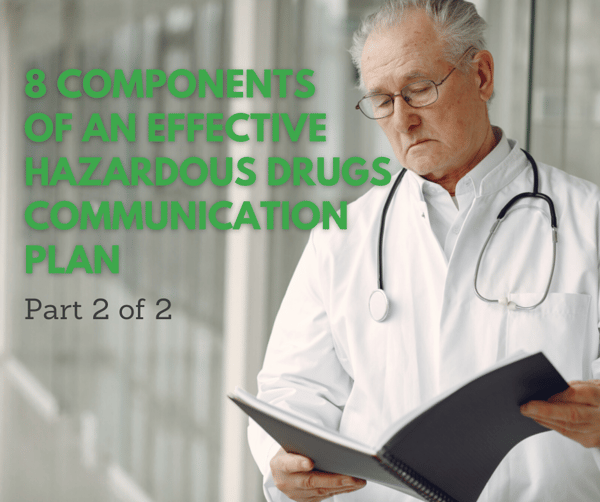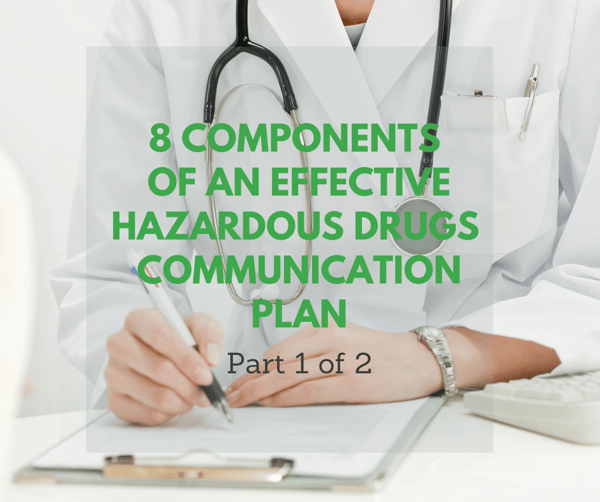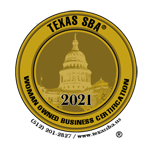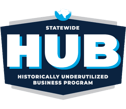In part 1, we talked about the basics of how to best communicate hazardous drugs safety information including making the guidelines accessible, searchable, and understandable. By ensuring these basics are covered you’ve drastically increased the chances that your healthcare workers will use the safety information and that their health and well-being will be protected.
Part 2: Eight Components Of An Effective Hazardous Drugs Communication Plan
Eight Components Of An Effective Hazardous Drugs Communication Plan, Part 1 Of 2
Like a seatbelt, a hazardous drugs communication plan is a layer of protection from potentially life-altering or deadly hazardous exposure. Most healthcare organizations meet current regulations by providing hazardous drugs handling and disposal information in physical binders or on their SharePoint intranet. However, even adhering to basic standards, this vital information is not easy to get your hands on when treating a patient or disposing of hazardous drugs or materials.
Patients Reap Rewards from Healthcare’s Increased Investment in Specialty Pharmacy
Throughout the COVID-19 public health crisis, hospitals and other surgical centers lost a major revenue stream in the form of elective surgeries. However, federal COVID relief funds, traditional investments in commercial real estate and a rise in investments in healthcare tech like specialty pharmacy, have helped to fill in the revenue gaps.
Rpharmy Receives Woman-Owned Business Certification
I am extremely proud to proclaim that Rpharmy is a Certified Woman-Owned Business! This recognition is a reflection of my passion for entrepreneurship and gives a well-deserved stamp of approval to Rpharmy and all the work we put into improving patient and healthcare safety.
Let us introduce you to one of our outstanding Rpharmy team members, Sherrel Miller. She works both behind the scenes doing the vital work of maintaining the safety databases including Black Box Warnings, FDA REMS, FDA Patient Medication Guides and FDA Safety Alerts AND she’s out in front taking great care of our FormWeb customers.
Rpharmy Wishes Lynn Huggins Much Luck in Next Chapter
We’ve got that mixed-emotions thing going on here at Rpharmy. After 16 years, our dear friend Lynn Huggins is retiring. While we are happy for the adventures yet to come for Lynn, we’re not sure what Rpharmy looks like without her; she’s been with us since the beginning.
Analysis of Clinical Decision Support at the Point of Care
8 Questions Answered About PPE & USP <800> Requirements
A key way to protect healthcare workers is effective PPE, right? Seems simple enough except that USP <800> has outlined specific PPE requirements that vary depending on the NIOSH category of HD, how they are being handled, and in what part of the facility.
Sherlene Christen Joins Rpharmy to Lead the Customer Experience Team
We are thrilled to welcome one of our most loyal FormWeb customers, Sherlene Christen, to the Rpharmy team. After 15 years as a FormWeb customer and more than 30 years at the esteemed Duke Raleigh Hospital, she’ll lead our Customer Experience Team helping healthcare providers and hospital systems around the world bring formulary and hazardous drug information to the point of care.
Sherlene’s impressive career at Duke Raleigh Hospital spanned more than 3 decades where she assisted in building and implementing the pharmacy module of the Meditech system, supervised pharmacy inventory control, and lead the conversion project from Pyxis to Omnicell automated dispensing system. She then managed the Omnicell system consisting of automated medication cabinets, anesthesia workstations, controlled substance management, workflowRx, and Pandora analytics reporting.
Press Release: Rpharmy Hires Tenured Clinical, Pharmacy Information Systems Tech to Lead Customer Experience Team
Sherlene Christen Brings More Than 30 Years Experience to Leading Formulary Management, HazDrugs Safety Information SaaS Provider









